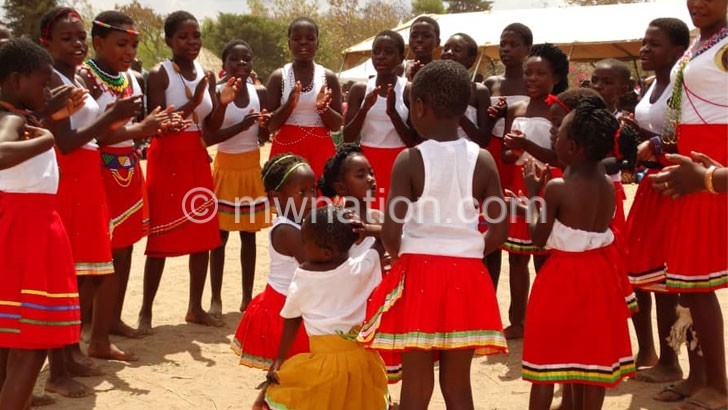2018 cultural fests And political vultures
Cultural festivals reigned supreme in 2018, as most tribal groupings, in the name of cultural heritage, decided to come together.
From Mdauku wa Atonga to Muhlako wa Ahlomwe, it was a year full of cultural activities. From the lips of the cultural custodians, the cultural festivals were aimed at promoting culture.

The year showed us a different face of these gatherings as political operatives found a fertile ground in these cultural events to advance their political agendas tempted by large crowds.
The year started on a high note with the Ngoni Jeres announcing their participation at the Tanzanian Ngoni cultural festival called the Maji Maji Rebellion Commemoration on February 26 and 27.
Then, another delegation of Ngonis left Malawi for Zambia to attend the N’cwala festival in Zambia hosted by the Paramount Mpezeni 3. Inkosi Mabilabo Jere of Mzimba led the delegation for the event that took place on Febrary 23.
It was, however, towards the end of the year that several local cultural festivals rolled out.
First was the Ngoni Jere cultural festival called Umthetho on August 10 at Mount Hora Heritage Centre in Mzimba.
With a budget of about K11 million, it was a three-day fest, which started with workshops for the youth and women. Held under the theme Culture and Development, the main event took place on August 11. Traditional dances, food and merry-making took the centrestage.
Custodians of the event banned patrons from donning political colours despite the presence of several political leaders, including state president Peter Mutharika.
Shortly after Umthetho, came Mdauku wa Atonga (Mwato) cultural festival. This event took place at Maganga Sports Stadium in Nkhata Bay. The three-day event, which was the first of its kind, started on August 17 and ended on August 19.
Among other activities, the Tonga heritage group honoured individuals who died on March 3 1959 during the State of Emmergency in the struggle for freedom and independence. Also honoured was the late Aleke Banda for pioneering journalism and artist Machuluka real name Andrew Mphande for promoting Tonga music.
Exit Mdauku wa Atonga, entered the Kungoni Arts Festival. Relatively not well-known among Malawians, the Kungoni Arts Festival is a brain Child of Kungoni Centre of Culture. It took place on August 18 at Kungoni Centre of Culture in Mua, Dedza.
The event mainly was all about traditional dances which included ingoma, beni, chisamba, chingambe and many others.
On August 25, Chewas held their annual cultural festival; Kulamba. The ceremony took place at its usual venue in Mkaika Cultural Village in Zambia.
Kalonga Gawa Undi, the Paramount Chewa leader for Zambia, Malawi and Mozambique, and his special guest King Lubosi of the Barotseland II, presided over the event, which went on well as highlighted by traditional dances such as Gulewamkulu, from Malawi, Mozambique and Zambia.
Ngoni Maseko from Ntcheu and other districts also held their annual cultural festival called Umhlangano wa Maseko on September 1 at Mkolimbo Village, Traditional Authority (T/A) Kwataine in Ntcheu.
The event, as usual was characterised by traditional dances, beer and food.
Like their Ngoni Jere brothers, at this event the Maseko Ngonis banned political colours. It was attended by Vice-President Saulos Chilima and some cabinet ministers who represented President Mutharika who was away in China at the time.
But the controversy started during the annual Muhlako wa Ahlomwe cultural festival in Mulanje. The event, which was held at the group’s headquarters at Chonde also marked the 11th anniversary.
Speaking during the event however, chairperson for Mulhako, Leston Mulli said this is no political gathering.
“But I have one message for those going against APM: You are not winning any seat in the Lhomwe belt. What those rebels did has no place in our culture as Lhomwes.”
His remarks did not go down well with other political parties as well as commentators who accused Mulli of dragging a cultural event into a political one.
The irony is that the event was held under the theme: ‘Culture: a tool for unity’.
Tumbukas, who are one of the few cultural groups in Malawi with a well-preserved language, also held their cultural gathering called Gonapamuhanya on September 29 at Bolero, Rumphi.
Remembering the violence that happened in 2017 during a similar event, organisers banned the use of party colours.
Nevertheless, political drama followed the cultural festival once again after opposition political leaders left the venue in protest. MCP vice president Sidik Mia and Harry Mkandawire left the venue midway the event in protest of not being recognised.
Speaking to The Nation after the event Mia said: “We don’t worry about it anymore. That’s politics. What are we here for is solidarity we have shown Themba la Mathemba.”
As we soldier on in 2019, one can only ask the question: Are cultural groups helping promoting culture or are just being used for political gains?n





